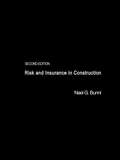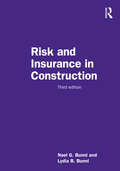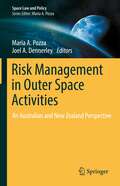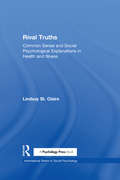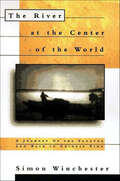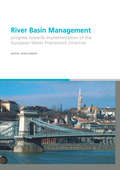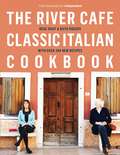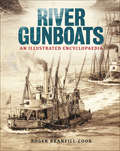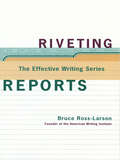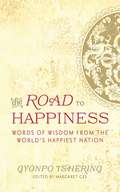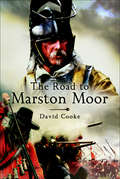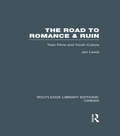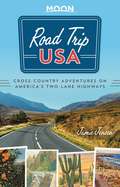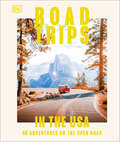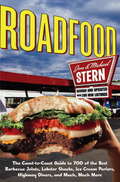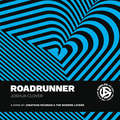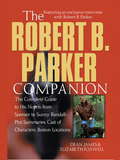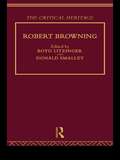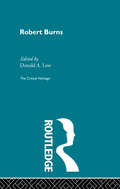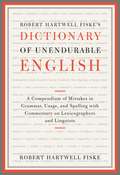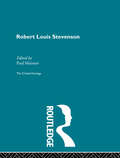- Table View
- List View
Risk and Insurance in Construction
by Nael G. BunniThose involved in construction have to cope with so much learning in their own discipline that they shun further involvement in subjects such as insurance and law which in themselves are so deeply and intensely complex. However, insurance and law are interwoven in the basic procedures used in the construction industry for undertaking work, be they design, construction, supervision or operation, or any combination of them. This thoroughly revised edition of Nael Bunni's successful book, formerly called Insurance in Construction, provides information on risk, construction law and construction insurance for those involved with all aspects of construction. The chapters on risk have been expanded to include recent developments in the area and provide further examples of events which could occur on what can be viewed as the most risky human work activity, namely construction. New chapters are also added to deal with the insurance clauses of the many new standard forms of contract published in recent years, including FIDIC's new suite of contracts published in September 1999, ICE's seventh edition of the civil engineering standard form of contract, and ICE's second edition of the design/build form.
Risk and Insurance in Construction
by Nael G. Bunni Lydia B. BunniThe new 3rd edition of Nael Bunni’s Risk and Insurance in Construction, now co-authored with Lydia Bunni, explains the need for insurance in construction and engineering projects and why it must be incorporated into the Conditions of Contract for such projects. It is unique in bringing together the background of the two topics of 'risk' and 'construction insurance', explaining the flow and the interaction between them and then dealing with how they have been used to formulate the 2017 FIDIC Suite of Contracts and the 2021 Green Book. This edition has been fully updated, and new chapters deal with the latest definitions of 'risk' outlined in ISO 31000: 2009, and specifically explains the principles embodied in the new Clauses 17, 18 and 19 of the Major Suite of the FIDIC forms of contract and how they should be used. An important chapter (Chapter 5) is included, discussing the logical transition from decision-making to risk identification to responsibility for those allocated with particular risks, to the potential liability that results. This includes discussing particular liabilities that may arise for parties typically involved in construction and engineering projects, including developers, owners, contractors and designers. This part of the book links insurance to the law and explains the interaction between the two topics. The correlation between liability and the need for indemnity, which can only be provided properly through insurance, is highlighted. The book is essential reading for practitioners from both the engineering profession and the insurance industry in all types of projects. Engineers who are required to use one of the Major Forms of the FIDIC Suite of Contracts, whether they are designers or contractors, and those involved in the insurance sector, whether brokers, claim consultants or insurance company personnel, will find this book to be an indispensable reference.
Risk Management in Outer Space Activities: An Australian and New Zealand Perspective (Space Law and Policy)
by Maria A. Pozza Joel A. DennerleyRisk Management in Outer Space Activities assesses selected risks associated with space activities, from an Australian and New Zealand perspective. The book explores the rise of commercial space activities and considers the development of Australia and New Zealand’s regulatory frameworks, and how they are equipped to address new and emerging risks in the space sector.The book examines the juxtaposition of international space law against the domestic legal regimes of Australia and New Zealand, and how these regulatory frameworks are designed to create governance mechanisms to control space risk. Both national jurisdictions approach space risk from the perspective of liability and international legal obligations, but as a result of their different historical space trajectories, their risk approaches differ. This is illustrated by research that suggests that from an Australian point of view, much of its space industry development has been influenced by Cold War era military and national security concerns. On the other hand, the New Zealand perspective is grounded on the rapid market-led commercial development that is currently underway in the country.The book examines a variety of risks that can and do emerge in the course of undertaking space activities. It does this by presenting a series of space risk case studies. There are chapters devoted to examining commercial space risks, space insurance, the risks posed by space debris, cybersecurity and space assets, light pollution as a risk for astronomy and the risks inherent in landing objects on the Moon. The work contained in this book is intended to provide a clear, practical and informed approach to understanding risk management in outer space activities. It will appeal to policy makers, risk professionals, space lawyers, national space agencies as well as academics, researchers and students
Rituals for Every Day: Simple Tips and Calming Quotes to Refresh Your Mind, Body and Spirit
by Summersdale PublishersIncluding wise words, simple ideas and easy-to-follow advice, this soothing book will help you master the art of daily rituals A daily ritual is more than a routine: it’s an act of self-care that’s carried out mindfully, and with reverence. You could use a ritual to set an intention for your morning, to help you process difficult emotions, or to manifest your goals – but whichever kind you choose, a ritual will always bring focus to the present moment and imbue your life with a sense of calm and purpose.Within these pages you will find a raft of simple but effective rituals to try as well as tips to help you on your journey, including:Fitting rituals into a busy scheduleHow daily practice can improve your physical and mental well-beingInspiration for creating your own ritualsWhether you use them to empower, energize, calm or inspire, daily rituals will help you to live fully and intentionally, and this beautiful book will guide you on your way.
Rituals for Every Day: Simple Tips and Calming Quotes to Refresh Your Mind, Body and Spirit
by Summersdale PublishersIncluding wise words, simple ideas and easy-to-follow advice, this soothing book will help you master the art of daily rituals A daily ritual is more than a routine: it’s an act of self-care that’s carried out mindfully, and with reverence. You could use a ritual to set an intention for your morning, to help you process difficult emotions, or to manifest your goals – but whichever kind you choose, a ritual will always bring focus to the present moment and imbue your life with a sense of calm and purpose.Within these pages you will find a raft of simple but effective rituals to try as well as tips to help you on your journey, including:Fitting rituals into a busy scheduleHow daily practice can improve your physical and mental well-beingInspiration for creating your own ritualsWhether you use them to empower, energize, calm or inspire, daily rituals will help you to live fully and intentionally, and this beautiful book will guide you on your way.
Rival Truths: Common Sense and Social Psychological Explanations in Health and Illness (International Series in Social Psychology)
by Lindsay St ClaireIt is common sense that our survival as individuals depends on the survival of our physical bodies. However, common sense has been medicalised. Terms such as 'road rage' and 'premenstrual syndrome' sound like medical problems and suggest that it is affected individuals, rather than experiences or circumstances that require treatment.Without denying their importance, Rival Truths challenges four basic common sense views of health and illness and offers rival social psychological explanations. The primacy of biological facts is challenged by looking at the effects of social psychological influences, such as those mediated by stress. The assumption that medical practices are scientific is challenged by evidence that they also reflect and recreate social constructions. The assumption that medical advances are the most effective way to combat disease is questioned as their success may rely on changes in beliefs or behaviour, and finally, critical analyses suggest that medical treatment can sometimes be to the disadvantage of patients.Lindsay St. Claire has helped to raise awareness that health problems might be caused by social arrangements, not biological dysfunction. Thus, social psychology might suggest new ways to enhance health status which do not depend on medical breakthroughs. This book will be of interest for health psychology students, medical students and anyone involved in caring professions.
The River at the Center of the World: A Journey Up the Yangtze and Back in Chinese Time
by Simon WinchesterA stunning tour of China, its people, and its history. Chosen as one of the best travel books of 1996 by the New York Times Book Review. Rising in the mountains of the Tibetan border, the Yangtze River, the symbolic heart of China, pierces 3,900 miles of rugged country before debouching into the oily swells of the East China Sea. Connecting China's heartland cities with the volatile coastal giant, Shanghai, it has also historically connected China to the outside world through its nearly one thousand miles of navigable waters. To travel those waters is to travel back in history, to sense the soul of China, and Simon Winchester takes us along with him as he encounters the essence of China--its history and politics, its geography and climate as well as engage in its culture, and its people in remote and almost inaccessible places. The River at the Center of the World is travel writing at its best: lively, informative, and thoroughly enchanting.
River Basin Management: Progress Towards Implementation of the European Water Framework Directive
by John LawsonRiver Basin Management is a collection of papers presented at a conference on implementation of the EU Water Framework Directive, held in Budapest in May 2005. The Water Framework Directive requires progressive protection and enhancement to rivers, lakes, estuaries, coastal waters and wetlands by the year 2015. At the heart of this major new piece of legislation is the requirement for all EU member states to prepare river basin management plans for all river basin catchments, providing the basis for coordinated improvements to water management, leading to better water quality and sustainable aquatic environments in lakes and rivers. The papers cover a wide range of topics including pilot studies for the development of river basin management plans, public participation in the planning process, water quality monitoring, modeling and analysis, identifying and addressing pollution and meeting environmental objectives. The book presents an array of experience from eighteen European countries in the implementation of the EU’s most far reaching environmental legislation. It is an invaluable source of information and ideas for the widespread preparation of river basin management plans now starting throughout Europe.
The River Cafe Classic Italian Cookbook
by Rose Gray Ruth RogersThirty years after its doors first opened, The River Café remains one of London's most iconic restaurants, loved for its innovative Italian food. Pioneering chefs Rose Gray and Ruth Rogers together changed the face of Italian food in Britain, championing seasonality well ahead of their time from their West London kitchen, which won a Michelin star in 1998 and has kept it ever since. The restaurant helped launch the careers of Jamie Oliver and Hugh Fearnley-Whittingstall, to name but two. Over the course of decades, Rose and Ruth visited Italy time and again, fascinated by the subtleties of dishes from the many different, and diverse, regions of the country. Their unique approach to Italian farmhouse cooking was learned from local mothers, grandmothers, cousins and wine makers who invited them into their kitchens and shared wisdom and precious family recipes. This book gathers together Rose and Ruth's personal interpretations of those heirloom recipes. It's a celebration of the real, classic food of Italy; the traditional, regional food they ate on their travels; and the food they went on to cook at the restaurant and at home. These are the recipes they became well known for, as well as some that are cooked less and less in Italy these days and which Rose and Ruth longed to preserve and pass on.
River Gunboats: An Illustrated Encyclopaedia
by Roger Branfill-CookA comprehensive, fully illustrated encyclopedia of river gunboats from the early 19th century to the present day. The first recorded engagement by a steam-powered warship took place on a river, when in 1824 the Honorable East India Company&’s gunboat Diana went into action on the Irrawaddy in Burma. In the 150 years that followed, river gunboats played a significant part in over forty campaigns and individual actions around the world. This comprehensive reference book covers the development of riverboat warfare from the early 19th century to current riverine combat vessels in service today. River gunboats proved to be the decisive factor in a wide range of conflicts across the world—from the New Zealand Wars to the American Civil War, and from both World Wars to the conflicts in Indochina and Vietnam. This lavishly illustrated encyclopedia describes the river gunboats that saw action, plus those converted river steamers which took part in combat. This volume also includes maps of the river systems where they operated, together with narratives of the principal actions involving river gunboats.
Riveting Reports (The Effective Writing Series)
by Bruce Ross-LarsonWhether you are composing a Web page on the Internet or agonizing over an annual budget report, these books are the key to clarity, accuracy, and economy in any writing task. Covers everything from the first spark of inspiration to the final draft. Writers will see how a series of careful questions will lead them to the messages of their reports, and will learn how to let those messages drive the structure of the piece. From this foundation they will be able to create a paragraph-by-paragraph plan of their entire report. A final chapter explains the author's techniques for editing reports of any length.
The Road to Happiness: Words of Wisdom from the World's Happiest Nation
by Gyonpo Tshering Margaret GeeWith clear, simple prose, and poetic turns of phrase, this inspirational collection of quotations reflects the unique country of Bhutan and its universal embrace of compassion, understanding, and kindness. Some of the quotes are also a bit quirky and funny—why not? After all, this remarkable little kingdom in the Eastern Himalayas just may hold the secret to lifelong happiness. Renowned for their government edict that “gross national happiness is more important than gross national product,” the Bhutanese grounding in Buddhist ideals suggests that material and spiritual development should occur side by side—something we can forget too often. So dive into this inspiring collection of wisdom, proverbs, and general sage advice to help you on your own road to happiness—or at least put a smile on your face.Although, as the Bhutanese saying goes, You don’t have to smile if you are pleased, nor do you have to frown if you are displeased. People who do this don’t get so many wrinkles!One dream cannot rest on two pillows.Evil words are like poisonous flowers. Evil actions are like poisonous roots. It is more important to have good teeth in your head than a hat which fits properly on it. Just as there are green fertile pastures and barren plains, the same is true for the territory of the heart and mind.If you take the jungle away from a free, roaming snow leopard it will feel like a poor street dog.So give the gift of happiness today!
Road to Marston Moor
by David CookeThe Battle of Marston Moor was key in English history. It was the largest battle of the Civil Wars, and was decisive. This fresh study reconstructs the battle in graphic detail, and tells the story using the words of those who took part.
The Road to Romance and Ruin: Teen Films and Youth Culture (Routledge Library Editions: Cinema)
by Jon LewisThis book analyses the teen film as the rare medium able to represent the otherwise chaotic and conflicting experience of youth. The author focuses on six major issues: alienation, deviance and delinquency, sex and gender, the politics of consumption, the apolitics of youth(ful) rebellion, and regression into nostalgia. Despite the many differences within the genre, this book sees all teen films as focused on a single social concern: the breakdown of traditional forms of authority – school, church, family. Working with the theories of such diverse scholars as Kenneth Keniston, Bruno Bettelheim, Erik Erikson, Theodor Adorno, Simon Frith, and Dick Hebdige, the author draws an innovative and flexible model of a cultural history of youth. Originally published in 1992.
Road Trip USA: Cross-Country Adventures on America's Two-Lane Highways (Road Trip USA)
by Jamie JensenCriss-cross the country on America's two-lane highways with the 25th anniversary edition of the ultimate guide to the classic road trip. InsideRoad Trip USA you'll find:11 routes through the heart of America, color-coded and extensively cross-referenced to allow for hundreds of possible itinerariesMile-by-mile highlights celebrating the best of Americana, including roadside curiosities, parks, diners, and the local history and personality that makes each small town and big city uniqueOver 125 streamlined maps covering more than 35,000 miles of two-lane American blacktopFull-color photos and illustrations of America both then and nowExpert advice from road-warrior Jamie Jensen, who sped along nearly 400,000 miles of highway in search of the perfect stretches of pavementInsight into the great American road trip, as well as resources, history, and fun facts along the wayHit the road, roll down the windows, and discover the soul of the country with Road Trip USA.
Road Trip USA: Cross-Country Adventures on America's Two-Lane Highways (Road Trip USA)
by Jamie JensenThe Road Awaits! Criss-cross the country on America's classic two-lane highways with Road Trip USA!Inside Road Trip USA you'll find:A flexible network of route combinations color-coded and extensively cross-referenced to allow for hundreds of possible itinerariesMile-by-mile highlights celebrating the best of Americana, including roadside curiosities, parks, diners, and the local history and personality that makes each small town and big city uniqueOver 125 detailed driving maps covering more than 35,000 miles of classic American blacktopFull-color photos and illustrations of America both then and nowExpert advice from road-warrior Jamie Jensen, who sped along nearly 400,000 miles of highway in search of the perfect stretches of pavementInsight into the heart of the great American road trip, as well as resources and suggestions for the best books to read as you explore the USRoad Trip USA is so full of the beauty of the American highway, why wait to start your next adventure? Hit the Road!
Road Trips in the USA: 50 Adventures on the Open Road
by DK TravelHit the open road with 50 epic drives promising the all-American adventureWhether you’ve always dreamed of skirting the US on a motorcycle, are looking to go coast-to-coast in an RV or simply want to roll down your car windows and plug into a classic playlist, Road Trips in the USA will give you all the inspiration you need for a road trip to remember.Featuring 50 once-in-a-lifetime drives, Road Trips in the USA is a celebration of riding the open road. Turn the pages to discover:50 driving routes ranging from a few hours, such as the scenic Hana Highway, to week-long trips like the iconic Route 66Inspirational maps pinpointing all the key stops to make en route, such as classic landmarks and historic restaurantsPractical information for each trip, including start and end stops, duration, distance, and road conditionsBeautiful photography capturing the highlights of every driveTwist through Glacier National Park on the dramatic Going-to-the-Sun Road, leaf-peep along the Blue Ridge Parkway and enjoy the ocean breeze on the Pacific Coast Highway – with Road Trips in the USA, taking the scenic route has never been easier. There’s no better way to see the US than from behind the wheel, so buckle up for the stuff of road-trip dreams.
Roadfood: Recipes and Lore from Our Favorite Shops Coast to Coast
by Jane Stern Michael SternNow you can re-create the best and most inventive sandwiches in America right in your own kitchen. In this eating tour of the nation, those gurus of the road, Jane and Michael Stern, hunt down nearly 100 examples of supreme sandwichery. You'll enjoy mouthwatering discoveries from nearly every state, from California (grilled Gruyere with leeks on multigrain from a neighborhood bakery in Los Angeles) to Maine (an overflowing, warm lobster roll from a seaside diner) to Florida (a Cuban: ham, pork, Swiss, and garlicky salami with pickles, lettuce, and tomato). The Sterns have tracked down America's best muffuletta (cold cuts and cheese topped with a bold and briny olive salad on Italian bread) and the specialty of Louisville, Kentucky (the Hot Brown: white turkey meat under sizzling cheese with tomato and bacon), not to be confused with Hot Truck (a hot pizza sub baked open-face, a campus sensation in Ithaca, New York). Each of the legendary heroes, hoagies, wraps, grinders, blimps, gyros, and subs comes with its own quirky story, making this book as much fun to read as it is to cook from.
Roadrunner (Singles)
by Joshua CloverJonathan Richman and the Modern Lovers' 1972 song “Roadrunner” captures the freedom and wonder of cruising down the highway late at night with the radio on. Although the song circles Boston's beltway, its significance reaches far beyond Richman's deceptively simple declarations of love for modern moonlight, the made world, and rock & roll. In Roadrunner, cultural theorist and poet Joshua Clover charts both the song's emotional power and its elaborate history, tracing its place in popular music from Chuck Berry to M.I.A. He also locates “Roadrunner” at the intersection of car culture, industrialization, consumption, mobility, and politics. Like the song itself, Clover tells a story about a particular time and place—the American era that rock & roll signifies—that becomes a story about love and the modern world.
The Robert B. Parker Companion
by Elizabeth Foxwell Dean JamesFinally, here is the complete guide to Robert B. Parker's novels from Spenser to Jesse Stone to Sunny Randall, plot summaries, cast of characters, Boston locations and maps, and more.<P> Even before he was named Grand Master for Lifetime Achievement by the Mystery Writers of America, Edgar® Award-winning Robert B. Parker had assumed the mantle of dean of American crime fiction. "Taking his place beside Dashiell Hammett, Raymond Chandler, and Ross MacDonald" (Boston Globe), he transcended the crime genre. As one of the most prolific writers in the world, he reinvented crime writing. <P> Now his millions of fans can discover everything about Robert B. Parker and his books: <P> - Comprehensive biography of Robert B. Parker<P> - Inside the Spenser novels<P> - All about the Jesse Stone and Sunny Randall novels<P> - Parker's stand-alone fiction<P> - Complete cast of characters<P> - Spenser on film<P> - Robert B. Parker's Boston: locales, crime scenes, and maps<P> - Memorable quotes<P> - Inclusive bibliography<P> - Plus, an exclusive and insightful new interview with Robert B. Parker
Robert Browning: The Critical Heritage (Critical Heritage Ser.)
by Boyd Litzinger Donald SmalleyFirst published in 1995. Routledge is an imprint of Taylor & Francis, an informa company.
Robert Burns: The Critical Heritage (Critical Heritage Ser.)
by Donald A. LowThe Critical Heritage gathers together a large body of critical sources on major figures in literature. Each volume presents contemporary responses to a writer's work, enabling students and researchers to read for themselves, for example, comments on early performances of Shakespeare's plays, or reactions to the first publication of Jane Austen's novels.The carefully selected sources range from landmark essays in the history of criticism to journalism and contemporary opinion, and little published documentary material such as letters and diaries. Significant pieces of criticism from later periods are also included, in order to demonstrate the fluctuations in an author's reputation.Each volume contains an introduction to the writer's published works, a selected bibliography, and an index of works, authors and subjects.
Robert Hartwell Fiske's Dictionary of Unendurable English: A Compendium of Mistakes in Grammar, Usage, and Spelling with commentary on lexicographers and linguists
by Robert Hartwell FiskeRobert Hartwell Fiske aims to eliminate laxity in language today by way of this witty and engaging reference. Fiske rails against "laxicographers and ding-a-linguists" who, with their misguided thinking, actually promote the dissolution of the English language. He also illustrates why dictionaries don't always provide the correct meaning or usage of a word. With concise instruction and numerous examples of misused words, Fiske makes it easier than ever to learn from others' mistakes. This comprehensive dictionary of common misusages lays bare the mistakes we all make every day. Robert Hartwell Fiske, the grumbling grammarian of our time, shows you the definitive right way and wrong way to use language--and illustrates why dictionaries don't always provide the correct meaning or usage of a word.
Robert Louis Stevenson: The Critical Heritage (Critical Heritage Ser.)
by Paul MaixnerFirst Published in 1995. Routledge is an imprint of Taylor & Francis, an informa company.
